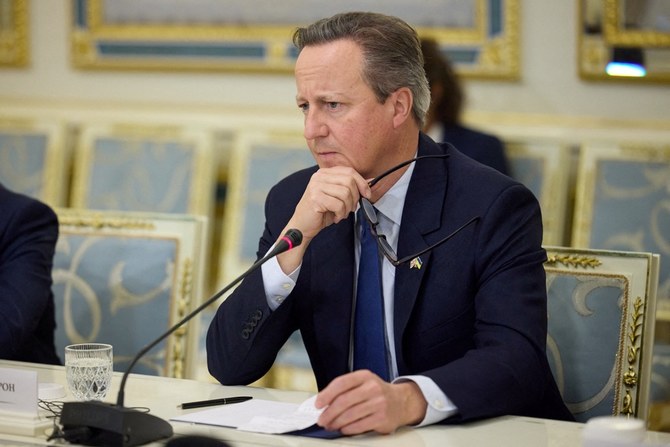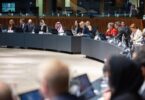Alistair Burt
Occasionally domestic politics pulls a surprise that no smart commentator expects, and the UK has just experienced one with global implications: the country has a new foreign secretary. Confounding Westminster watchers and alarming even some in his own party, Prime Minister Rishi Sunak has appointed former Prime Minister David Cameron, who has been out of the political mainstream since 2016.
The appointment is no disrespect to the man Cameron succeeds, James Cleverly, who by all accounts is popular with his counterparts around the diplomatic world and steadied the foreign office after a run of rather shaky predecessors.
But it is a bold and good move. It recognizes the unique character of the position in UK politics. The foreign secretary is rarely seen as overtly partisan, recognizing that British interests outlive governments, with decisions and positions largely to be inherited by successive administrations. It suits a consensual approach to decision making, the sort demonstrated by a party leader who built and led a rare coalition government in British politics from 2010-15. In addition, a foreign secretary of the UK — which is a UN Security Council member, a NATO pillar and G7 player — meets with the very top level of world leaders. To have the background of six years as a head of government will score well in what is a rather hierarchical environment: an elite group will know that he has succeeded to a level beyond themselves.
The choice of Cameron is a good one, with such a style and background. But it is also bold in the context of UK politics, and shows a determination in both men to put the country’s interests above those of party. Cameron is not popular with a noisy section of Conservatives at present, as a man positioned more to the political center than many current MPs, and who led the campaign against leaving the EU. Paradoxically, however, now that decision is made, his appointment should signal to Brussels that the knee-jerk confrontations to suit elements of the British media might now be over, and the grown-up job of working together with Brussels in a difficult world, from migration to war in Ukraine, is in the hands of those who mean it.
His record will be scrutinized keenly. No one who has led his country for over half a decade is without controversy and debate over decisions. I worked as Cameron’s minister for the Middle East and North Africa between 2010-13, through the upheavals of the Arab uprisings. He faced particular criticism over his Libya and Syria positions. I think the criticisms were unfair, and his thinking behind key decisions tells a better story. In Libya we pored over the intelligence suggesting that a proven killer of opponents was on his way to Benghazi to dispose of them “alley by alley,” and in Syria the use of chemical weapons on children appalled him. Memory of a world standing by, as in the horrors of Rwanda in which he had taken a keen interest, waskey to his deciding that the UK should not do so. One should wonder if the death and exile toll in Syria might have been different had the UK Parliament listened to him in 2013 when he sought no more than a salutary option of military force to stand up against the barrel bombers and Obama had followed suit — rather than MPs voting down his proposition.
While he will scrutinize evidence, he will take decisions without agonizing endlessly over them — a necessary skill at his level. They will be stress tested. The UKs National Security Council, bringing together in a formal structure security, intelligence and foreign policy elements, dates only from 2010 — created by Cameron himself as a first act in power after seeing the aftershocks of the Iraq war laid at the door of the informal “sofa government” decision-making style of its predecessor, an administrative reform for which he is given too little credit.
Cameron will not be short of places to exercise his grasp of world affairs and advise his prime minister. China will test him, as it sits in a different place from when he was in office, and he will have followed the recent Biden-Xi summit closely. It is telling that he has made his first personal visit as foreign secretary to Ukraine. But perhaps his most urgent task is in the Middle East, with the explosion of extraordinary and distressing violence in southern Israel and Gaza. He knows and values the importance of the Arab world. He built a strong relationship with Israel, but in 2010 famously referred to Gaza as “an open-air prison.”
Playing a leading part in a conclusion that will inevitably involve not just Gaza but also the West Bank and East Jerusalem to provide both justice and security for all would be a fine legacy in due course.







